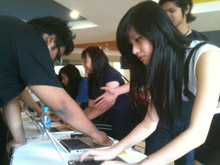SINGAPORE, Jul 27, 2010 (IPS) - A small group of students gathered, drawn like butterflies to the sweet sound of soft rock and pop music. Home to one of the most vibrant student communities in Singapore, Ngee Ann Polytechnic is no stranger to loud music and louder fashion sense. What was unusual for the crowd, though, was the concert’s mission – to drum up youths’ support against human trafficking.
After all, the trafficking of people, including for sex, is still a concept alien to many in affluent Singapore, where young people learn quickly to be more apathetic and less passionate – especially, but not exclusively – about human rights.
"I didn’t know that Singapore also has this sex trafficking going on. It’s quite a shock to me that in our country, even this type of things exist," says 19-year-old Ng Chun Yan, at United Nations Development Fund for Women (UNIFEM) Singapore’s ‘Sound Out’ event on Jul. 23. "It’s an important issue to look at," she says.
"Human trafficking is now the third largest international crime in the world…. It’s not something that is really more of a left-of-centre, sort of out there issue that isn’t a big deal. It’s an enormous issue," says UNIFEM Singapore volunteer Katrina Dick.
The event, comprising a talk and a concert by homegrown musicians, was part of the U.N. organisation’s public awareness programme to put a stop to trafficking of women and children in Asia, including to Singapore.
UNIFEM Singapore also launched a website, inviting young people to leave a note to support the cause, as well as contribute or listen to music tracks, and spread the message through Facebook, a popular social networking site with some 500 million users worldwide.
"We actually dedicated a show on Radio Heatwave (a campus radio station) to talk about ‘Sound Out’ as well as UNIFEM," says 20-year-old Germaine D’Rozario, a student-radio presenter who pledged her support on the website. "I knew it was about sex trafficking, but I really didn’t know the statistics, that there are 1.2 million kids in Asia being trafficked each year."
"Singapore is a destination for girls from foreign and less developed countries to be trafficked for sex exploitation. Although we are lucky enough not to have the same thing happening to Singaporean girls, that does not mean that we are not able to play a part to help these victims," says Fifi Handayani, a 19-year-old student.
"From this event, I’ve learnt a lot more about the sex trafficking issues. And as a woman, I feel that the issue is close to my heart," adds Handayani, an account director at m:idea – the first media conglomerate in Singapore managed by tertiary students – which was commissioned by UNIFEM Singapore to coordinate and manage the concert.
Already, more than 2,300 people have visited the anti- trafficking website and declared their support. But some say the campaign’s effectiveness remains to be seen.
"It’s a step in the right direction, but will anything change here, even if one million Singaporeans sign up on the site to say we want to put a stop to this?" says one 18- year-old student, who declined to be named.
He does raise a valid point. The Singapore government, in 2005, turned a deaf ear to some 30,000 citizens who petitioned against the legalising of casinos here, an issue which sparked unprecedented public debate.
Even with the potential of news spreading virally through social media, it is unlikely that the campaign against sex trafficking will attract the same attention, much less put any real pressure on the government to clamp down on the issue.
"I think in Singapore, most of the people think that since it’s not happening to them, and it’s not a very open situation, then they hardly care about it," says Gaby Aw, a 17-year-old student volunteer at ‘Sound Out’.
Like many here, D’Rozario is "not too sure" about the human trafficking situation in Singapore, or that it even exists. "I think we’re quite safe (from such occurrences) here, but we may never know," she says.
"Everyone knows about Thailand, Cambodia and Vietnam, where sexual exploitation and trafficking is a big, big problem, but not many people know that Singapore is also affected," says Dick.
Maps depicting sex trafficking activity in the region resemble trade routes, and show the flow of women and children from poorer, developing regions of countries like Thailand, Vietnam and Cambodia, to richer city centres within the country – or across borders to well-off neighbours like Singapore.
However, the Singapore government in June protested a U.S. government report ranking the republic alongside countries such as Afghanistan on a human-trafficking watch list, dismissing it as a "political ritual" rather than an objective study.
The Philippine embassy in Singapore reported some 212 cases of human trafficking here involving Filipino women in 2007. Nearly 30 percent of the women had admitted to having engaged in prostitution or to have been coerced into sexual acts.
Filipino consul Neal Imperial called it just the "tip of the iceberg" as it reflected only women who turned to the embassy for help.
Exact statistics of sex trafficking activity, though, are not easy to derive. Even within various U.N. agencies, Dick says, the figures are different.
"We try not to get too caught up with the numbers because basically if this is happening to one person in Singapore, if this is happening in a flat next door to you, would it be ok to do nothing?" she asks.

No comments:
Post a Comment